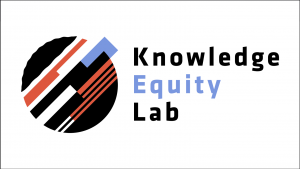Launched earlier this fall, the Knowledge Equity Lab (KEL) is calling for pluralistic approaches to knowledge production. With next generation leaders at its core, the lab works to cultivate and support an intentionally diverse community of initiatives with a common aim to reduce the vast inequities that exist in science, scholarship, and knowledge production at large.

“This is an opportunity to bring together various projects with common themes of understanding the power dynamics of knowledge making and circulation in different contexts. It allows conversations among the different partners to enrich each other’s ideas going forward,” said Leslie Chan, director of the KEL and associate professor at the Centre for Critical Development Studies, University of Toronto Scarborough, where the lab is based.
KEL serves as an umbrella for Bioline International, a long standing open access platform for journals based in the Global South, and the Open and Collaborative Science for Development Network (OCSDNet), exploring open science as a tool for transformative development. It also houses The Knowledge G.A.P. project, the Open Praxis Forum, Community Knowledge Learning Hub, and the UNESCO Knowledge for Change Toronto Hub, all working towards bridging and weaving knowledge traditions both locally and internationally through intentional collaborations with diverse and often under-represented knowledge holders.
Conversations about Open Access that focus on who pays for journal articles are too narrow, maintains Chan. “It doesn’t take into account the structural barriers faced by the majority of the people involved with research who are outside the mainstream of the Academy,” Chan says. “There are many people making knowledge who are important and whom we should listen to and learn from. We want to draw attention to this issue.”
In addition, the lab’s other mission is to get students thinking about research in new ways.
“Learning often takes place outside of the classroom,” Chan says. “The lab is a chance for students to be engaged in first-hand research, in active knowledge making.”
With a limited number of jobs in academia, Chan wants to expose students to careers using their research skills to help organizations solve societal problems.
Some early career researchers active in SPARC’s OpenCon community are leaders within the lab on initiatives to support a new generation of scholars with a broad view of how science can be communicated. Undergraduate students from across disciplines – development, health studies, biology and linguistics – are paired with community partners, such as local nonprofit organizations on the projects. Chan is developing a fellowship program to add to the crew of around 20 students currently involved.
Helping Chan carry out the work for the new enterprise is Maggie Huang, a graduate of the international development program at the University of Toronto Scarborough and coordinator for the lab. While working with a Toronto-based non-profit on a youth participatory action research project, she took part in the mentorship training program for UNESCO’s Knowledge 4 Change global consortium and was trained a a community-based research mentor with the philosophy that knowledge is most useful when co-created and driven by community members, rather than an academic with a predetermined research question.
“The purpose and process of research and learning shouldn’t be limited to elite academia, whose forms of knowledge transmission are often inaccessible to the general public, whether due to barriers like paywalled research or the use of jargon,” Huang says. “It should be co-created with communities to address real-world problems that people are experiencing.”
Huang says she hopes the lab will be a space for collaboration and experimentation, where people can explore other forms of knowledge sharing – through the arts, storytelling, social media, etc. – that aren’t historically recognized as legitimate. “I’m really inspired by the creativity and activism of the next generation to show us new modes and platforms to share knowledge and advance social change,” she says.
Tasneem Mewa is an undergraduate student studying Critical International Development Studies at the University of Toronto, Scarborough and is a co-creator of the lab’s Open Praxis Forum (OPF). OPF is a website where researchers can submit their work in a variety of mediums (papers, photos, videos, etc.) and contributors are asked to reflect on their research experience.
The project was born during a session at OpenCon 2018, and it aims to highlight the research process, not simply research outputs. Mewa envisions a more equitable system for sharing information that involves consensual knowledge creation, ethics of care for both researchers, and communities impacted by research projects and collaboration.
“It’s important for students to get research experience to unlearn some of the conventions we have been taught, to value a variety of knowledges and epistemologies, to become better listeners, and to learn how to bridge theory and practice,” Mewa says.
Although Alejandro Posada has a full-time public policy consulting job in Bogota, Colombia, he continues to work with the lab’s Knowledge G.A.P. project where he has published about the financial and economic behavior of the publishing industry and its implications to knowledge inequity. A 2016 graduate of the University of Toronto Scarborough, Posada recently completed a master’s program at Oxford University and also assists with the lab’s new research fellowship program.
Although the lab is operating virtually now, it has physical space on the campus provided by the university. Here, Chan hopes students and community partners will gather and the lab can host workshops and community events. “The lab is a place where a lot of projects come together,” Posada says. “The way in which [Chan] has created spaces for students to critically engage in the production of knowledge is quite inspiring.”
Reposted from the SPARC blog which is profiling with members of the OpenCon community.